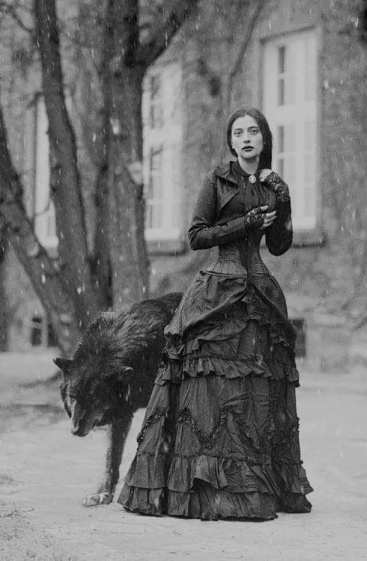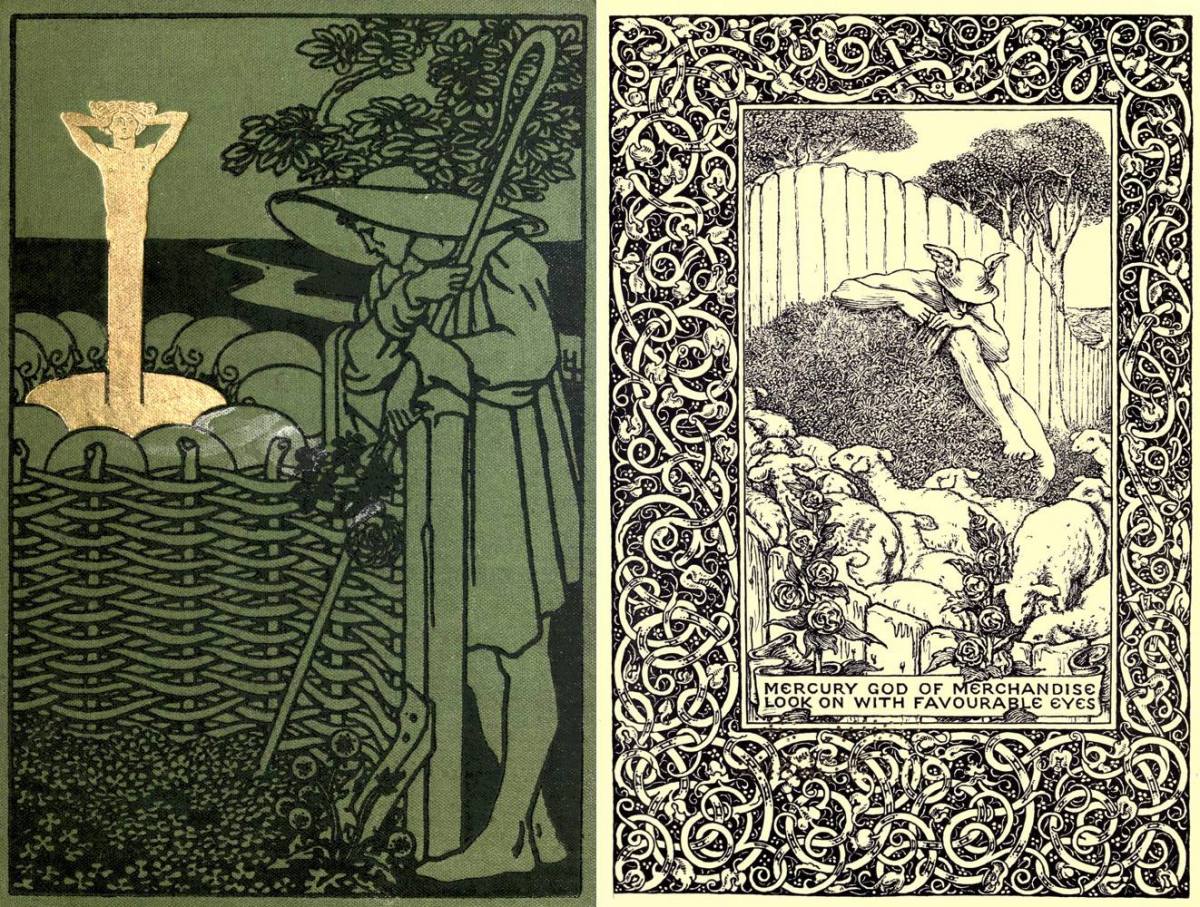
There is a story we tell about the past. Where the mundane was imbued with the sacred, where the forest still held magic, where the world was larger while our community was small.
Neofolk is the modern revival of folk music traditions interwoven with metal, ambient, gothic, and other “fringe” music, usually focusing on pre-Christian pagan spirituality, de-sacrailization, and a look to the past. The bands that have dominated the genre, who have the largest tours and quotes in music magazines, entered this genre because they wanted a romantic art form that told the story of Europe’s past. This was to revive a nationalist identity, just as it was in 19th Century romanticism, to imbue white people with a sense of mythology about Europe’s past and the need for a rebirth.
This concept is largely known as “metapolitics,” the process by which thinking and philosophy is changed in a culture to make it more malleable for political change. Since their defeat in World War II, many fascists have turned to the world of metapolitics in art, in philosophy, and music, as a way of influencing the culture so that far-right politics have a fighting chance. This is a strange twist on Marxist revolutionary Antonio Gramsci’s theses about cultural struggle: when you change the perspective you can change the political outcomes.
Bands like Sol Invictus, Death in June, Changes, and Fire + Ice were tied to far-right nationalist movements, including parties like the National Front or skinhead gangs like the American Front, and saw the music as a way of creating a deep nostalgia and sense of longing for white Europeans. By fetishizing a false narrative about the past they can then pair the modern world, with its liberalism and multiculturalism, as the inverse of the history they are fetishizing. The romantic qualities they are offering in their music seem only possible through the revolutionary nationalism they are peddling. These bands grew and set the tone for the burgeoning neofolk scene, so much so that the scene’s narrow view of European heritage and nationalism became the lens through which all bands were judged. The genre was then was allowed to simmer with this ideology without intervention because the hold that fascists had on the music was so strong.
The far-right did not invent neofolk, it does not own it, and it should not be given to them.
The left is a romantic tradition that looks both forwards and backwards, dreaming of what the world could be and picking up traditions and histories that tell that story (both real and imagined). This is why, as Margaret Killjoy has pointed out, genres like black metal and neofolk appeals so much to anarchists, whose sense of passion and prefiguration draws on a well of romanticism. Neofolk attempts to modernize the pre-modern, the stories, music, cultural significance of societies past, and while European revival music has dominated coverage, neofolk is a worldwide phenomenon that draws from traditions from South Asia to indigenous North America to West Africa to Northern China.
There is another neofolk, one that rejects fascist stories about white identity and imperialism, one that is fueled by decolonization, a connection to the earth and Old Gods, to the spirit that fought feudalism, capitalism, industrialism, and the ravages of white supremacy. We refuse to let fascists define our music, and instead are committing this work to start a new “scene” that is inclusive, diverse, and founded on resistance. This is openly and unabashedly antifascist neofolk, a music scene that not only refuses nationalism, but makes itself an enemy of white supremacy.
Sort of like Michael Muhammad Knight did with Taqwacore, imagining a music scene that did not exist to that people would be inspired to create it, we are humbly trying to give this a name and declare its existence. This is, to a degree, a falsehood, since antifascist neofolk has existed as long as the genre has, especially where the music was created as a work of postcolonial cultural struggle. But what we hope to accomplish here is to be intentional about creating an antifascist space that brings together the bands and create an clear cultural space that people can identify with. Instead of the assumptions that exist about neofolk, we are the people who we want neofolk to be in the future. By defining antifascist neofolk as a possibility we create a standard to apply to the genre, a line to force musicians to cross, and a question to pose. When the far-right defines the genre they define the values, morals, and what is considered acceptable. Now we can define those boundaries.
Neofolk is one of the best examples of what Rose City Antifa refers to as “contested space.” Anti-Racist Action was formed in the 1980s around contested spaces like working class neighborhoods and music venues, specifically inside the punk scene that had both left and far-right wings. Music scenes like skinhead Oi! was a struggle for who was going to define the genre and have access to the musical spaces and the people. ARA refused to cede that ground to white power skinheads, and forced them out of their recruiting spaces. Fascists need music as a recruitment tool since it drives at the heart before the head is ready, and we refuse to allow them that. Instead, just as people have done successfully for the past few years in black metal, we are creating a counter-culture of our own and seeing neofolk as a place to struggle against white supremacy rather than a radioactive wasteland.
This blog will remain relatively simple without a lot of frills, almost no design, and we will update the visuals slowly over time. The point will be to highlight new bands, building an “antifascist neofolk canon,” and to speak of both the positive organizing in neofolk spaces and the ongoing problems in the scene. The posts will be primarily focused on explicitly antifascist neofolk bands, but we will include the occasional band from adjoined genres like black metal, ambient, industrial, and anti-folk. We will also highlight a few bands who, while not be explicitly political, have separated themselves from the far-right. Most neofolk bands do not have primarily political lyrics, so instead we look at themes, public statements, behaviors and activism, and other things that allow them to stand out, including artists who have left neofolk bands that turned towards the far-right. This will include a special focus on bands that derive their sounds from outside of Europe and North America, and include musicians of color who are often erased from the story of neofolk.
This will be paired with a playlist we encourage people to follow, which will start small and will grow as blog posts are added. We will also create a resource list for other things that are topical, such as antifascist black metal lists, information about fascist entryism into the music scene, antiracist organizing tools, great record labels, and news. Expect a lot of album announcements, show reviews, band lists, interviews, and hopefully a lot more.
While this is a singular effort, we want your help! Please contact us with suggestions for bands, share widely, and start a conversation. If you are with a label that supports this, we would be happy to check out new music and prop up bands that line up with the values here. We also would love contributions and submissions, but note that there is not money behind this and it is instead a labor of love (at least right now). We will create a donation option, but other than that we just want to focus on the music for the time being. We want, more than anything, to be the place people go when looking for great new music, and to redefine what this scene can be. Posts will be slow starting, but expect a lot more to come.

Glad to see your work! Can you please credit the photograph?
LikeLike
Couldn’t find the correct credit. All that I could find is that it is from 1916.
LikeLike
No, it’s not from 1916! No one wore their corsets on the outside then. I’m pretty sure it’s been nabbed from deviant art. Try a reverse search.
LikeLike
Damn, we got misinfo that this was legit some random 1916 photo. We will credit now.
LikeLike
Great idea! Can I suggest Idles, my current favourite band and proud antifascists?
LikeLike
Can you provide a link?
LikeLike
Rome.
LikeLike
While he may be anti-fascist as he has said in the past, his new album gives me cause for concern. He is at the very least pandering to the fascist audience. He himself could be closeted. I’m hoping he’s not, but he needs to take a MUCH firmer stance and show the world he isn’t about that sort of lifestyle. It should reflect in his music without one having to wonder.
LikeLike
THIS!!! Thank you! I would like to be a part of this.
Our group Nøkken + The Grim (http://nokken.band) is anti-fascist neofolk, although I usually call it primal folk because of the bad politics of some groups and a constant fear of negative association. I am a Pagan animist drawing upon shamanic roots in my Magyar (táltos tradition) and Germanic heritage, and the group is centered around respect for life in its multifarious forms as well as focusing on the voice of the marginalized. Please feel free to email me at booking.nokkenandthegrim@gmail.com
I can also point you in the direction of other musicians and bands that are part of this movement of de-colonization and revitalization of lost indigenous spiritualities, as I have connections across the Pagan and Heathen communities and folk revival.
LikeLike
Freyja90 on DeviantArt, 2013, titled “Hello Darkness My Old Friend”
LikeLike
Damn, we got misinfo that this was legit some random 1916 photo. We will credit now.
LikeLike
“Hello Darkness My Old Friend” by Freyja90 on DeviantArt
LikeLike
Damn, we got misinfo that this was legit some random 1916 photo. We will credit now.
LikeLiked by 1 person
While I think that you are doing a good work, “the far right” as you call it actually invented Neo Folk and pretty much defined many of its themes. Sol Invictus/Tony Wakeford cut his ties to the right in the early nineties. He’s denounced his past and has become a very liberal, lovely person. If you don’t believe me, talk to him or just befriend him on Facebook.
LikeLike
Unfortunately, Tony Wakeford really did not leave those politics behind. We appreciate that he has said as much, but then why is he basically doing Julius Evola and Oswald Spengler tribute albums? It is not just him, it is deep in his music.
LikeLike
Tony Wakeford was s FB friend until he was posting anti Muslim memes that showed up on my wall in the years between 2013 and 2015. I unfriended him. He argued that he wasn’t racist. I disagreed with him.
LikeLike
cool effort.
Don’t let neofascists ruin any scene.
LikeLike